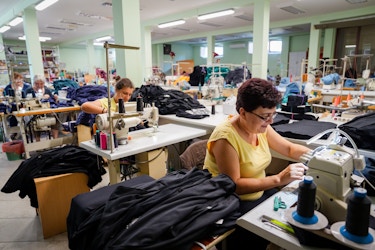Whether you are onshoring, reshoring, or looking for a manufacturing partner overseas, it’s important to be prepared with the right questions before you reach out to potential producers. Factories are extremely busy, and strong communication is crucial to getting this key part of your supply chain in place.
“Once things are in motion, it’s important to respond quickly to factory requests, reviewing pilot runs, etc.,” said Matt Carson, Founder of and Managing Partner at OpenMill. “Good manufacturers are busy; having your plan together before reaching out helps you and the factory.”
Read other client reviews, check each partner’s credentials, and map out your product specifications before you reach out to potential partners. In addition, consider asking these five questions to make sure they’re the right fit.
[Read more: How to Find a Factory to Manufacture Your Product]
What are your quality controls?
This simple question can tell you a lot about a potential manufacturing partner’s processes, compliance, and sourcing standards. Ideally, you can get a sample from the manufacturer before ordering a larger quantity. That sample should provide a high level of quality assurance.
If your partner isn’t open to providing samples, ask about their certifications, compliance records, and labor standards. For instance, clothing manufacturers located in the United States have to meet product safety regulations, show their environmental impact, and adhere to local labor laws.
“It’s important to select a manufacturer that follows established standards and can provide up-to-date certifications, such as an ISO 9001:2015. If your product is for a specialized application, you can also ask about industry-specific certifications,” wrote ThomasNet.
As a follow-up to this question, ask where each manufacturer sources its materials. The quality of your finished product depends on the quality of the suppliers. This question also helps you understand how ethical and sustainable your entire supply chain is.
[Read more: Looking for a Manufacturing Partner? 17 Key Industry Terms to Know]
How do you price your orders?
Payment terms can vary, and typically consist of a few different components:
- Minimum order quantity (MOQ). The MOQ is the minimum number of products that can be purchased in a single order. Smaller runs typically cost more than larger orders. Ask how many units are in a minimum order so you can adjust your profit margin accordingly.
- Shipping and logistics fees. Ask how your products will be shipped, including the cost, delivery times, and methods. If you have a highly specialized product that needs to be handled with care, make sure the manufacturer is equipped to package and use premium shipping options.
- Sample pricing. If you decide you want a sample before putting in a full order, there may be some fees involved. Some factories will provide free samples as long as you pay for the shipping and customs fees, but this varies from partner to partner.
- Additional services. “One way to lower costs, streamline production, and reduce delivery times is to select manufacturers that offer a suite of support services, such as finishing, assembly, or engineering,” wrote ThomasNet.
Shop around to find the best value. Cheaper isn’t always better: Some manufacturers will sacrifice quality to offer a more affordable price.
If your partner isn’t open to providing samples, ask about their certifications, compliance records, and labor standards.
What is your lead time?
Lead times can have a big impact on the success of your business. If you can’t keep your product in stock within a reasonable time frame, your empty shelves will turn away disappointed customers. Slow lead times can impact your cash flow, putting your payroll, loan repayments, and other bills at risk.
“When walking into a meeting with potential manufacturers, it is important to understand how lead times work, an average for your industry and how much time you can afford to give the manufacturing process,” wrote Forbes.
You should also ask what happens if there’s a hiccup in the production process. Do they have a recovery process in place to help keep your supply chain running? Can they outsource to other plants or contractors?
Can you scale production?
Related to lead time is the ability to increase production as your business grows. Some businesses have big seasonal spikes; others are on a path to growth that will have big peaks and valleys. Your manufacturing partner should be able to scale up or down, depending on your business maturity and life cycle. Ask about their production capacity, if they work with subcontractors, and if they plan to invest in technology to future-proof their production processes.
How do you protect intellectual property?
Last but not least, ask about the potential partner’s ability to safeguard your IP. “A manufacturing partner will be working with other businesses, and it’s possible one of your competitors may also contract with the same factory. As a result, your IP may be exposed, unless the manufacturing partner has the proper protocols in place to keep your information safe,” wrote Gembah, a product design and manufacturing platform.
Cybersecurity is also a concern. Ask how a potential partner keeps your patented information secure to avoid the risk of knock offs or black market products undermining your brand’s value.
CO— aims to bring you inspiration from leading respected experts. However, before making any business decision, you should consult a professional who can advise you based on your individual situation.







